Abstract
Pneumococcal surface protein A (PspA) has been shown previously to elicit antibodies protective against pneumococcal infection and to be necessary for full pneumococcal virulence in mice. The protein was originally defined by the two mouse monoclonal antibodies Xi64 and Xi126, which together recognized PspA on 14% of pneumococcal isolates. Some PspA molecules reacted with both antibodies, but most reacted with only one or the other. In the present study we demonstrated that PspA is produced by all pneumococci, confirming our hypothesis that there are variants of PspA which are not detected by Xi64 and Xi126. We produced a rabbit antiserum and five additional monoclonal antibodies specific for PspA for these studies. The rabbit antiserum reacted with each of 95 pneumococcal isolated tested, comprising 16 capsular serotypes. One or more of the seven monoclonal anti-PspA antibodies reacted with 95% (53 of 57) of pneumococcal isolates tested. The specificity of the monoclonal and polyclonal antibodies to PspA was confirmed in two ways: (i) by detection of molecules on wild-type pneumococci that are identical in molecular weight to those detected in Western blots (immunoblots) with Xi64 and Xi126 and (ii) by the use of mutants of Streptococcus pneumoniae that fail to produce PspA or that produce a truncated form of PspA. By using the seven monoclonal antibodies, we observed 31 PspA types among the 57 isolates. When the 53 strains reactive with the monoclonal antibodies were analyzed by capsular type as well as by serologic type and molecular weight of PspA, we observed 50 different clonotypes of pneumococci.
Full text
PDF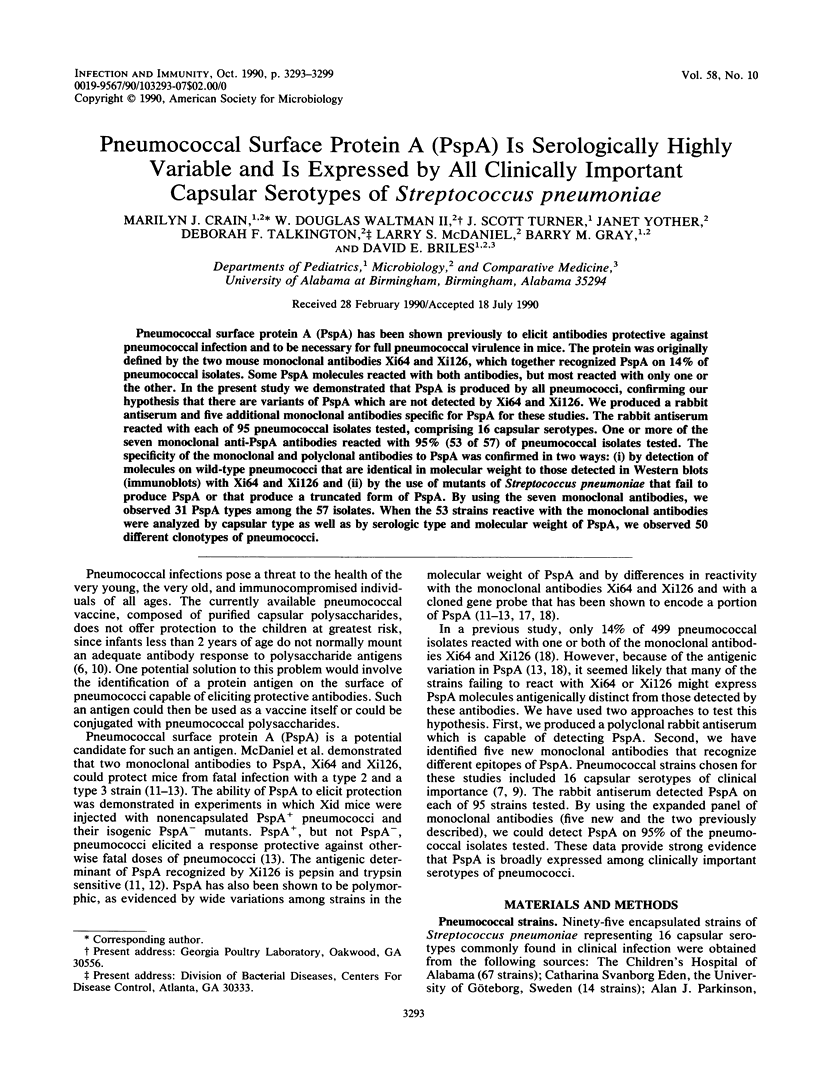
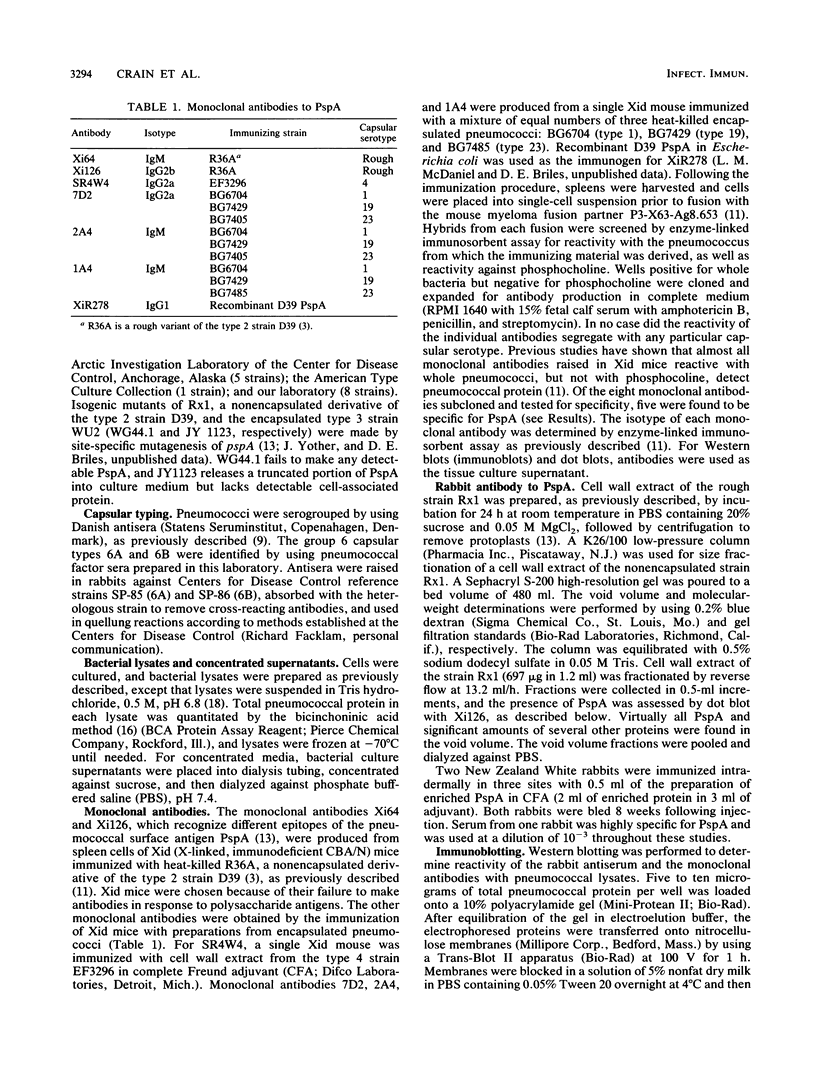
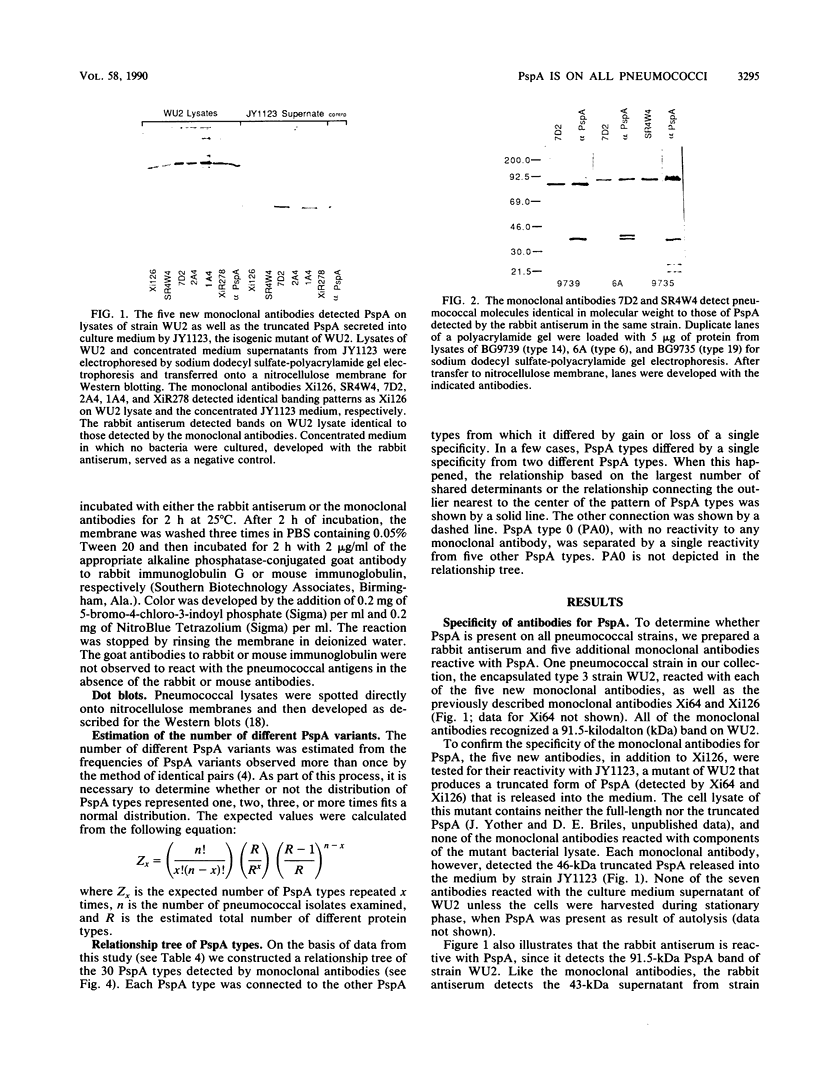
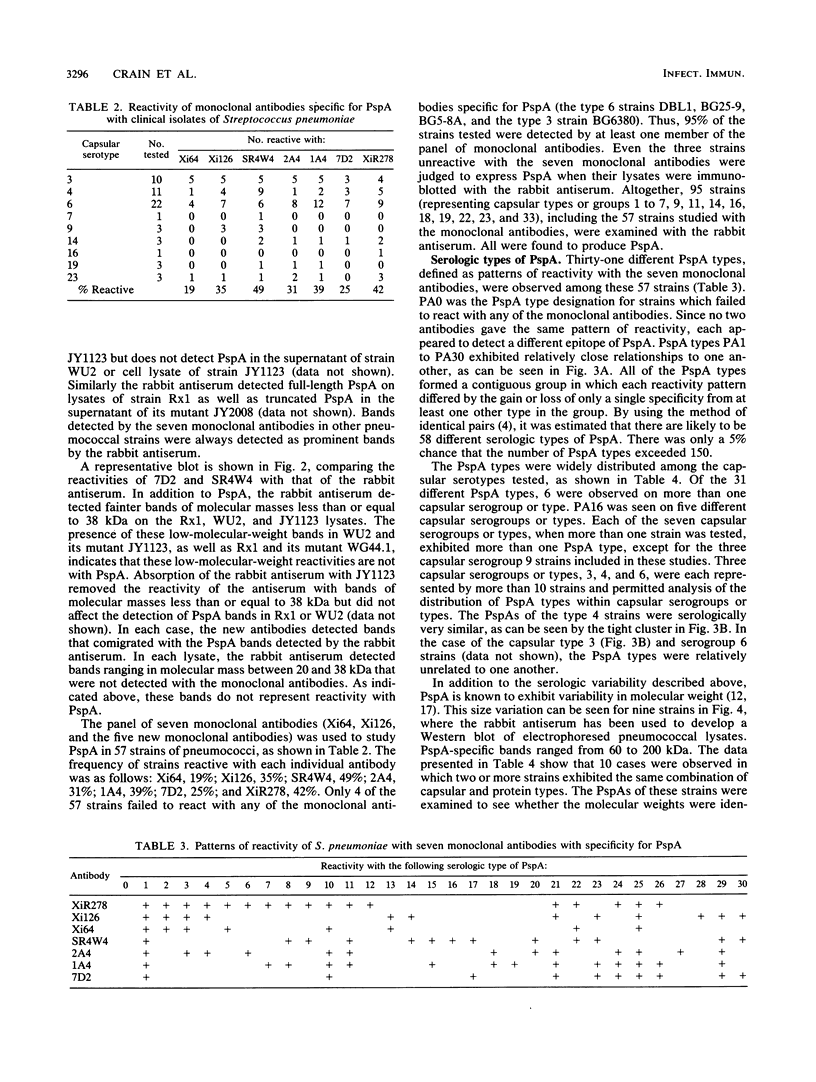
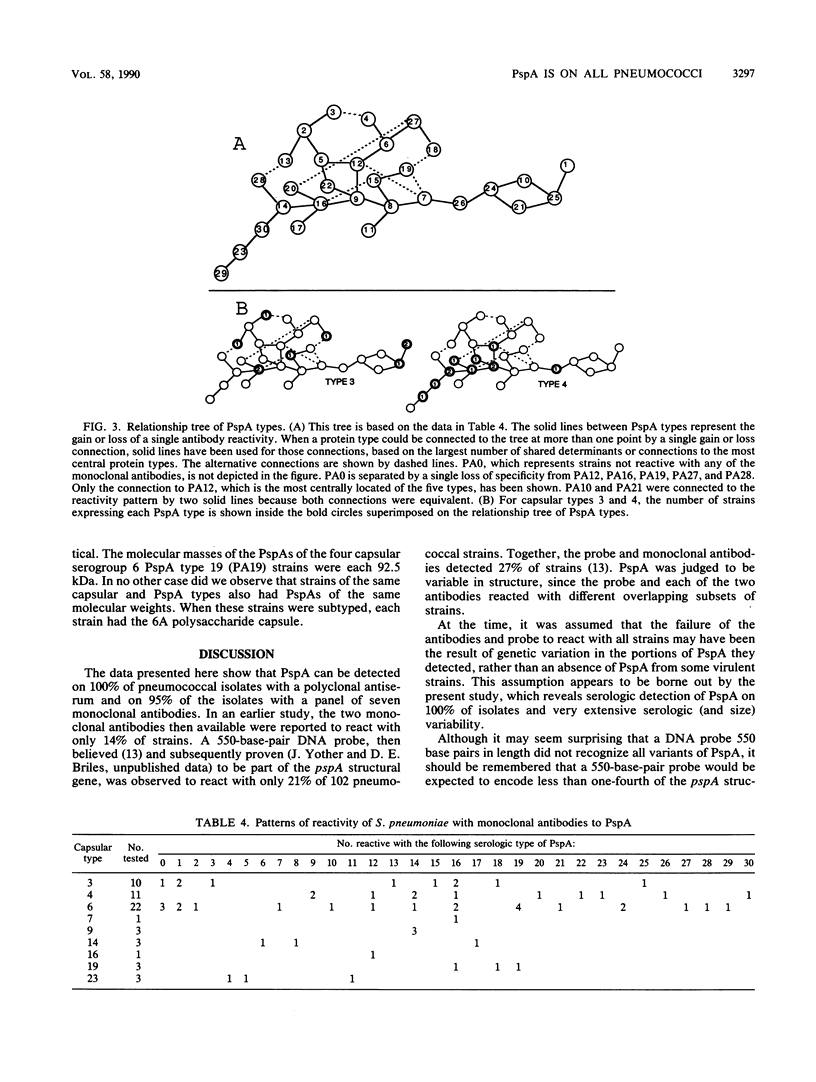
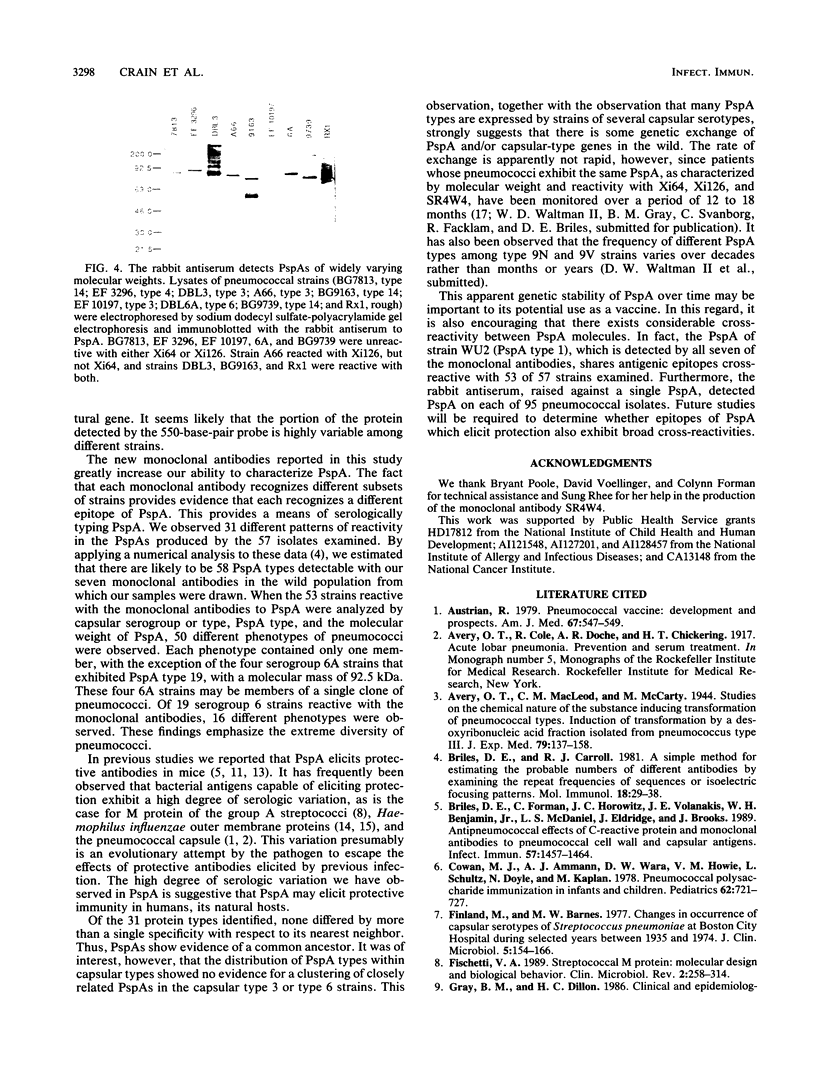
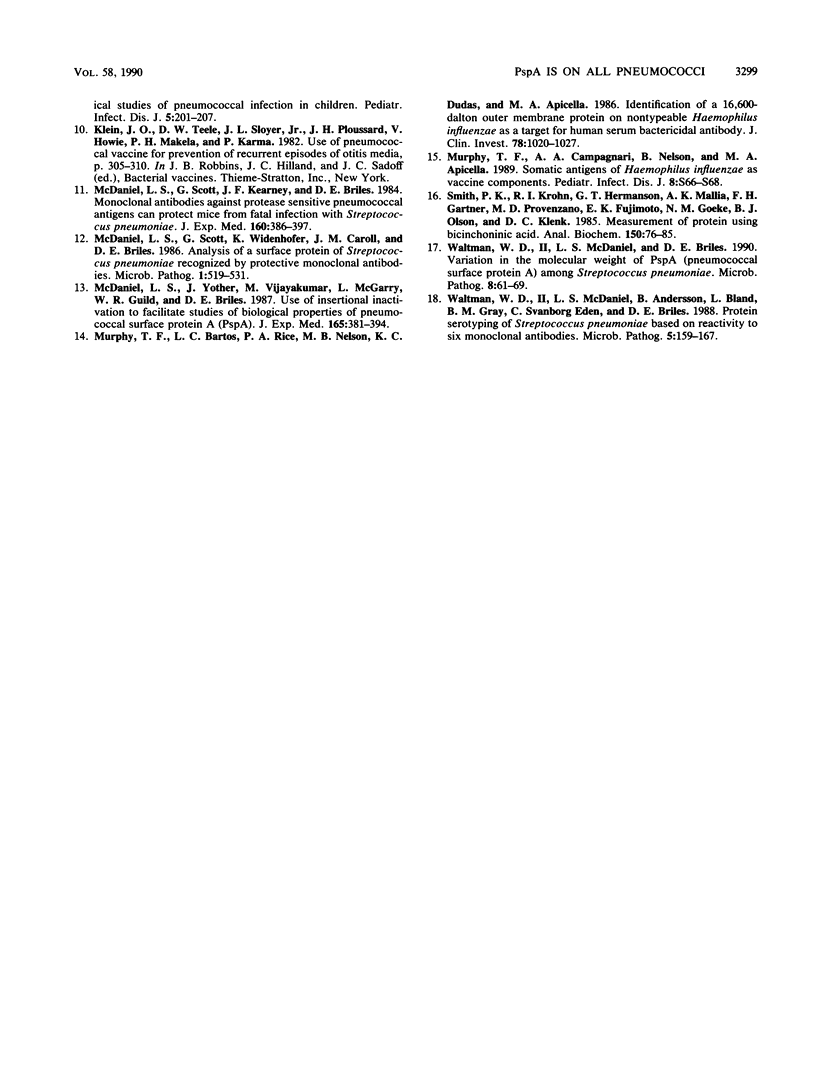
Images in this article
Selected References
These references are in PubMed. This may not be the complete list of references from this article.
- Austrian R. Pneumococcal vaccine: development and prospects. Am J Med. 1979 Oct;67(4):547–549. doi: 10.1016/0002-9343(79)90222-5. [DOI] [PubMed] [Google Scholar]
- Briles D. E., Carroll R. J. A simple method for estimating the probable numbers of different antibodies by examining the repeat frequencies of sequences or isoelectric focusing patterns. Mol Immunol. 1981 Jan;18(1):29–38. doi: 10.1016/0161-5890(81)90045-6. [DOI] [PubMed] [Google Scholar]
- Briles D. E., Forman C., Horowitz J. C., Volanakis J. E., Benjamin W. H., Jr, McDaniel L. S., Eldridge J., Brooks J. Antipneumococcal effects of C-reactive protein and monoclonal antibodies to pneumococcal cell wall and capsular antigens. Infect Immun. 1989 May;57(5):1457–1464. doi: 10.1128/iai.57.5.1457-1464.1989. [DOI] [PMC free article] [PubMed] [Google Scholar]
- Cowan M. J., Ammann A. J., Wara D. W., Howie V. M., Schultz L., Doyle N., Kaplan M. Pneumococcal polysaccharide immunization in infants and children. Pediatrics. 1978 Nov;62(5):721–727. [PubMed] [Google Scholar]
- Finland M., Barnes M. W. Changes in occurrence of capsular serotypes of Streptococcus pneumoniae at Boston City Hospital during selected years between 1935 and 1974. J Clin Microbiol. 1977 Feb;5(2):154–166. doi: 10.1128/jcm.5.2.154-166.1977. [DOI] [PMC free article] [PubMed] [Google Scholar]
- Fischetti V. A. Streptococcal M protein: molecular design and biological behavior. Clin Microbiol Rev. 1989 Jul;2(3):285–314. doi: 10.1128/cmr.2.3.285. [DOI] [PMC free article] [PubMed] [Google Scholar]
- Gray B. M., Dillon H. C., Jr Clinical and epidemiologic studies of pneumococcal infection in children. Pediatr Infect Dis. 1986 Mar-Apr;5(2):201–207. doi: 10.1097/00006454-198603000-00009. [DOI] [PubMed] [Google Scholar]
- McDaniel L. S., Scott G., Kearney J. F., Briles D. E. Monoclonal antibodies against protease-sensitive pneumococcal antigens can protect mice from fatal infection with Streptococcus pneumoniae. J Exp Med. 1984 Aug 1;160(2):386–397. doi: 10.1084/jem.160.2.386. [DOI] [PMC free article] [PubMed] [Google Scholar]
- McDaniel L. S., Scott G., Widenhofer K., Carroll J. M., Briles D. E. Analysis of a surface protein of Streptococcus pneumoniae recognised by protective monoclonal antibodies. Microb Pathog. 1986 Dec;1(6):519–531. doi: 10.1016/0882-4010(86)90038-0. [DOI] [PubMed] [Google Scholar]
- McDaniel L. S., Yother J., Vijayakumar M., McGarry L., Guild W. R., Briles D. E. Use of insertional inactivation to facilitate studies of biological properties of pneumococcal surface protein A (PspA). J Exp Med. 1987 Feb 1;165(2):381–394. doi: 10.1084/jem.165.2.381. [DOI] [PMC free article] [PubMed] [Google Scholar]
- Murphy T. F., Bartos L. C., Rice P. A., Nelson M. B., Dudas K. C., Apicella M. A. Identification of a 16,600-dalton outer membrane protein on nontypeable Haemophilus influenzae as a target for human serum bactericidal antibody. J Clin Invest. 1986 Oct;78(4):1020–1027. doi: 10.1172/JCI112656. [DOI] [PMC free article] [PubMed] [Google Scholar]
- Murphy T. F., Campagnari A. A., Nelson M. B., Apicella M. A. Somatic antigens of Haemophilus influenzae as vaccine components. Pediatr Infect Dis J. 1989 Jan;8(1 Suppl):S66–S68. [PubMed] [Google Scholar]
- Smith P. K., Krohn R. I., Hermanson G. T., Mallia A. K., Gartner F. H., Provenzano M. D., Fujimoto E. K., Goeke N. M., Olson B. J., Klenk D. C. Measurement of protein using bicinchoninic acid. Anal Biochem. 1985 Oct;150(1):76–85. doi: 10.1016/0003-2697(85)90442-7. [DOI] [PubMed] [Google Scholar]
- Waltman W. D., 2nd, McDaniel L. S., Andersson B., Bland L., Gray B. M., Eden C. S., Briles D. E. Protein serotyping of Streptococcus pneumoniae based on reactivity to six monoclonal antibodies. Microb Pathog. 1988 Sep;5(3):159–167. doi: 10.1016/0882-4010(88)90018-6. [DOI] [PubMed] [Google Scholar]
- Waltman W. D., McDaniel L. S., Gray B. M., Briles D. E. Variation in the molecular weight of PspA (pneumococcal surface protein A) among Streptococcus pneumoniae. Microb Pathog. 1990 Jan;8(1):61–69. doi: 10.1016/0882-4010(90)90008-e. [DOI] [PubMed] [Google Scholar]






